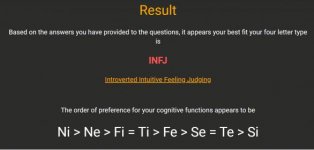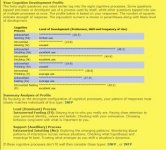[MENTION=32874]Vendrah[/MENTION] Thanks! Sometimes I do wonder if I have a perceiving function as a dominant rather than a judging function (Ne dom - it did come out pretty high here), but I've always seen myself as an introvert.
Actually, I dont think there is a need for a dominant function at all. Not if you score nearly 50% on any of 4 MBTI dimensions. I mix the descriptions with that in mind.
But I did that. First test was truity, 2nd one was k2k.
Here is TypeC
INTP
Ni>Ne>Ti>Si=Te>Fi>Fe=Se
16P
INTP-T
Mind
This trait determines how we interact with our environment.
40% E
60% I
Energy
This trait shows where we direct our mental energy.
83% I
17% O
Nature
This trait determines how we make decisions and cope with emotions.
75% T
25% F
Tactics
This trait reflects our approach to work, planning and decision-making.
35% J
65% P
Identity
This trait underpins all others, showing how confident we are in our abilities and decisions.
44% A
56% T
Now we are talking!
I need numbers, so im going to consider the cognitive functions on your first post in this thread with these results, although that opens some error due to different days.
N-S
Ni+Ne>Se+Si
Clear preference for Intuition over Observance.
T-F
Te+Ti>>Fe+Fi
Heavy preference for thinking
I-E
New relation
Ni+Ti>Ne+Te
Preference for introversion, slightly but enough to not be ambiversion.
P-J
New relation
Ne+Ti>Ni+Te
Its almost equal, but its slightly more to the P side. Strangely, 16P thinks your P is clear.
The new relation uses this principle (adapted on your case): "There is no sense into using sensoring cognitive functions to evaluate P/J dimension on an intuitive, and neither use feeling cognitive functions to evaluate P/J on a thinker. This principles extends to I/E". In the old version, it would give you INTJ (because of the Si vs Se), but I changed to fix an issue (open this topic before explaining the theory was a good idea, I fixed one flaw now).
Si vs Se
Preference for Si.
Ne vs Ni
Shy preference for Ni. It would be no preference for Ni over Ne for the record. Expected for INTJ (but for INTJ would be clear preference for Ni).
Fe vs Fi
Preference for Fi.
Te vs Ti
Preference for Ti. Expected for INTP.
Final saying: INTP, with some INTJ traits Ni-related. Close to INTX profile.
"Make decisions based on logical analysis done over time in their heads. Prize rationality and objectivity, will rely on what makes the most sense objectively. Insatiable thirst for knowledge and learning. Easily able to see ten steps ahead and predict what might happen in the future. Use intuition to find patterns, underlying principles, and ideas, to construct theories and frameworks, and to form connections as they talk, write, or create. Often start out life being less aware of and equipped to deal with feelings than other types."
----
[MENTION=29978]Methylene[/MENTION]
I have fixed the method error in your case with a new relation/equation, using this principle in your case:
"There is no sense into using feeling cognitive functions to evaluate P/J on a thinker. This principles extends to I/E".
So I switch:
"I-E
Ni+Ti+Fi+Si=Se+Te+Fe+Ne
There is no preference for introversion or extroversion on function stacks, but there is a preference for introversion on the 4-letter texts. It is a visible failure of my method here. Ill take
not for further investigation. [I actually meant that I would take for further investigation because I actually did]"
To:
"I-E
Ni+Ti+Si??Se+Te+Ne
TypoC and Keys2cognition test display different results. No conclusion can be drawn."
I wonder why your test results looks so different from TypoC an Keys2cognition, I thank you for doing both because it would display me fake method error if you did one only. The test results are so different that the only truthly conclusion I could do is the preference for thinking over feeling.
Your Ni shouldnt be your lowest cognitive function because, if that was true, your S would be pronounced or your Ne would be extra high in order to do a compensation. Your preference for Fe over Fi is weird to INTP type, since INTP is supposed to have Fe as lowest function and preference for Fi over Fe. Just for a matter of "solace" (I think thats the word) I ve started a search among ambiversion and ambivalence and the N/S is the most common ambivalence for INTP type as far as I remember (I/E comes in second).
About awbro method failure there is not much I can do.




